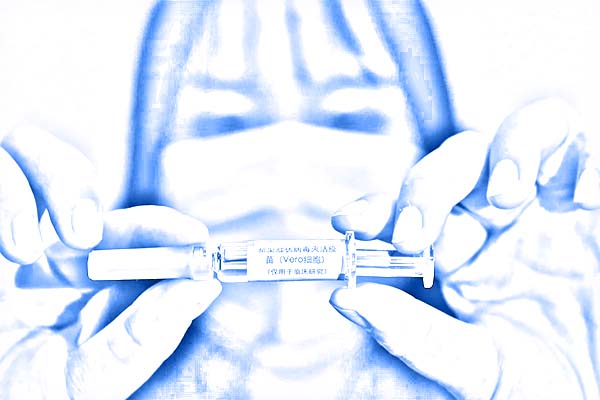In coronavirus vaccine race, Chinese and Oxford trials produce immune responses, offering hope in pandemic

Two vaccine trials – one by a Chinese team and the other out of Oxford in Britain – have produced an immune response in trial patients. Photo: Xinhua. Sketched by the Pan Pacific Agency.
BEIJING, Jul 21, 2020, SCMP. A coronavirus vaccine under early development by Chinese researchers produced a significant immune response for hundreds of volunteers, in one of two new studies offering hope as scientists race to develop a vaccine to counter the global pandemic, South China Morning Post reported.
The Chinese scientists have completed phase two of their trial, published in The Lancet medical journal on Monday, which found that one injection of either a low or medium dose of the vaccine “induced significant neutralising antibody responses to live Sars-CoV-2”, the name for the novel coronavirus. An earlier phase-one trial of the vaccine had produced immune responses, but the latest trial was widened to include individuals aged 55 or older, given their higher risk of death from the Covid-19 virus.
“Single-dose immunisation with the vaccine induced rapid onset of immune responses within 14 days, and significant humoral and cellular immune responses within 28 days in the majority of the recipients,” the team of Chinese scientists, led by Zhu Fengcai from the Jiangsu Provincial Centre for Disease Control and Prevention (CDC) and Guan Xuhua from the Hubei Provincial CDC, wrote.
Their results showed the vaccine, developed by the Beijing Institute of Biotechnology and Chinese vaccine maker CanSino Biologics, had “a good safety profile”.
Most of the participants given the vaccine at a centre in central China’s Wuhan reported mild or moderate reactions, most commonly fatigue, fever and headache. Seventy-four per cent of the 129 individuals who received the lower dose and 72 per cent of those who received the medium dose reported at least one negative reaction but none had serious adverse reactions.
Scientists from Oxford University’s Jenner Institute also published findings from an early vaccine trial on Monday in The Lancet. In that trial 543 participants were injected with an experimental coronavirus vaccine, produced with the Cambridge-based pharmaceutical company AstraZeneca. The vaccine produced both humoral and cellular responses against Sars-CoV-2, with antibodies for the virus peaking 28 days after vaccination and continuing to remain high up to two months later, the scientists said.
The most common side effects from the Oxford vaccine included fatigue, which was reported by 70 per cent of participants, and headache, reported by 68 per cent. Other reactions included muscle ache, malaise and feeling feverish but there were no serious adverse events.
While there were limitations to the Oxford study – including that participants were capped at age 55 and the short-term follow-up after vaccination – the scientists said the results supported the “large-scale evaluation of this candidate vaccine” for an ongoing phase-three programme.
“Phase-three trials are now under way in Brazil, South Africa, and the UK and will evaluate vaccine efficacy in diverse populations,” the Oxford study said.
The Chinese research team said their results supported moving to a phase-three effectiveness trial with the lower dose of their experimental vaccine, but also acknowledged study limitations, including that the entire participant population was from Wuhan.
They also noted that their participants were not exposed to the coronavirus after vaccination, so it was not known if they would be immune to infection.